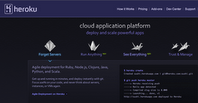WattDepot
 To create sophisticated games based upon energy consumption, it must be possible to collect energy data from meters, store the data, perform analyses on the data, and visualize the results. We developed WattDepot to provide an open source, vendor-neutral framework for energy data collection, storage, analysis, and visualization. WattDepot is useful not only as technology infrastructure for the Kukui Cup, but as infrastructure for other energy-related initiative such as the Smart Grid.
To create sophisticated games based upon energy consumption, it must be possible to collect energy data from meters, store the data, perform analyses on the data, and visualize the results. We developed WattDepot to provide an open source, vendor-neutral framework for energy data collection, storage, analysis, and visualization. WattDepot is useful not only as technology infrastructure for the Kukui Cup, but as infrastructure for other energy-related initiative such as the Smart Grid.
Makahiki
 Makahiki is a “serious game engine for sustainability”. It provides an open source, component-based, extensible environment for developing sustainability challenges such as the Kukui Cup and tailoring them to the needs of different organizations. One configures the Makahiki framework to produce a “challenge instance” with a specific set of game mechanics, user interface features, and experimental goals. Makahiki provides sophisticated instrumentation to support evaluation of how well the game mechanics supported the organization’s goals for the challenge.
Makahiki is a “serious game engine for sustainability”. It provides an open source, component-based, extensible environment for developing sustainability challenges such as the Kukui Cup and tailoring them to the needs of different organizations. One configures the Makahiki framework to produce a “challenge instance” with a specific set of game mechanics, user interface features, and experimental goals. Makahiki provides sophisticated instrumentation to support evaluation of how well the game mechanics supported the organization’s goals for the challenge.
Heroku
 Heroku is not technology developed specifically for the Kukui Cup challenge. Rather, it is a commercial “Platform as a Service” (PaaS) technology. Essentially, Heroku enables an organization to “rent” servers and disk space to run an application for a limited period of time, and Heroku will charge the organization based upon the amount of CPU and file space actually required by the application.
Heroku is not technology developed specifically for the Kukui Cup challenge. Rather, it is a commercial “Platform as a Service” (PaaS) technology. Essentially, Heroku enables an organization to “rent” servers and disk space to run an application for a limited period of time, and Heroku will charge the organization based upon the amount of CPU and file space actually required by the application.